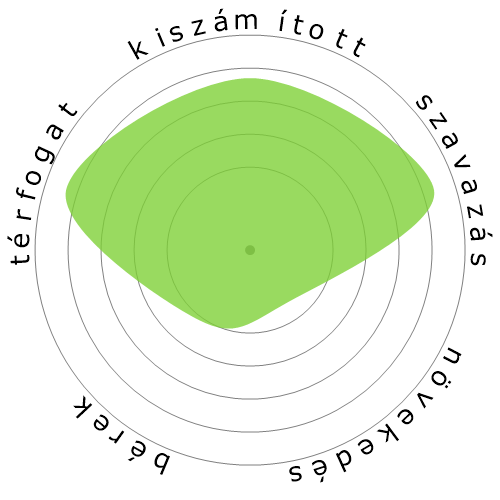Engedéllyel rendelkező gyakorlati és szakmai ápolók




Az emberek ezt is megtekintették
Számított automatizálási kockázat
Alacsony kockázat (21-40%): Ennél a szintnél a munkák csak korlátozottan vannak kitéve az automatizálás veszélyének, mivel ezek a pozíciók technikai és emberközpontú készségek kombinációját igénylik.
További információ arról, hogy mi ez a pontszám, és hogyan számítják ki, elérhető itt.
Felhasználói szavazás
A látogatóink szerint alacsony az esélye annak, hogy ezt a foglalkozást automatizálni fogják. Ezt az értékelést tovább erősíti a kiszámított automatizálási kockázati szint, amely 24% esélyt becsül az automatizálásra.
Mit gondol, milyen kockázatai vannak az automatizációnak?
Milyen valószínűséggel fogják Engedéllyel rendelkező gyakorlati és szakmai ápolók robotok vagy mesterséges intelligencia helyettesíteni a következő 20 évben?
Növekedés
A(z) 'Licensed Practical and Licensed Vocational Nurses' munkahelyi nyitások száma várhatóan 2,6%-kal nő 2033-ra.
Teljes foglalkoztatottság és becsült állásnyitások
A frissített előrejelzések 09-2025 időpontban esedékesek..
Bérek
A(z) 2023-ban a 'Licensed Practical and Licensed Vocational Nurses' éves középfizetése 59 730 $ volt, vagyis 28 $ óránként.
'Licensed Practical and Licensed Vocational Nurses' magasabb összeget kaptak, mint az országos mediánbér, ami 48 060 $-n állt.
Bérek az idők folyamán
Térfogat
2023 időpontjában 630 250 ember dolgozott 'Licensed Practical and Licensed Vocational Nurses' munkakörben az Egyesült Államokban.
Ez körülbelül a 0,42% -át képviseli az országban foglalkoztatott munkaerőnek.
Másképp fogalmazva, körülbelül minden 240. ember 'Licensed Practical and Licensed Vocational Nurses'-ként dolgozik.
Munkaköri leírás
Gondoskodjon beteg, sérült vagy lábadozó betegekről, illetve fogyatékossággal élő személyekről kórházakban, ápolási otthonokban, klinikákon, magán otthonokban, csoportos otthonokban és hasonló intézményekben. Lehet, hogy regisztrált ápoló felügyelete alatt dolgozik. Engedély szükséges.
SOC Code: 29-2061.00


Megjegyzések
As an example, take the humanised skill of empathy. Empathy is the emotional skill to understand and share the feelings of another person. This shared emotional connection is something many, if not all, patients crave and desire. Empathy is something that AI cannot replicate well. In order for empathy to occur between two individuals, both individuals must be capable of emotions. Humans are capable of emotions, but AI robots are not. Emotions are biological, chemical, and mental reactions to certain stimuli. These reactions are uniquely inherent to organic living biological beings. An AI robot is not an organic living being, and thus cannot produce emotions. The best an AI can do is be programmed in a way to say certain things when a patient exhibits particular facial responses or verbal/tonal nuances. However, there is more to empathy than just being responsive. There exists a shared feeling that a human can only feel with another human, or another animal, especially when one of those humans is in a medically ill or injurious state.
Critical thinking serves as another example of a humanised skill that AI will find difficult to replicate. Critical thinking is the intellectual act of considering certain concepts, and constructing a charitable and objective take on said concepts through abstract reasoning or empirical evidence. To further this, the more unique and nuanced those concepts are, the more difficult it will be to critically think about said concepts. In the healthcare settings that LVNs find themselves in, there exists many unique concepts, or in this case, situations. I will illuminate one and that would be the case of patients with severe dementia. Patients with this mental condition may showcase behaviour that includes, but not limited to, loud screaming, random crying and potential desires for killing. What to do with these kind of patients is something LVNs face on a daily basis. Should the LVN just ignore the patient? Doing so may endanger the patient to him or herself, or worse, endanger other patients situated in the same room. Ignoring patients is also considered abuse in healthcare settings. On the other hand, ignoring the patient may allow the LVN to give care to other patients with much more debilitating conditions in the meantime, and thus allowing the LVN efficient time management. The LVN can also attend to that patient first, but only to administer medication that will calm him down, and make the LVN’s work less difficult. This may prove detrimental, if a family member of another patient asked the LVN to administer medicine to him first, because he missed a dose earlier in the day. With all this in mind, one can see how as an LVN there are many factors that they have to consider when making a reasonable decision, such as proper ethics, personal feelings, logical order of work, and so on. The LVN must be able to evaluate these factors and utilise his intellectual capacity for reason to support making the right decision. An AI’s intellectual capacity is much more rigid than a human’s mind. An AI robot cannot improvise at any given moment in the same fashion as a human. Unique situations, such as the aforementioned dementia case, requires a mind being able to asses many nuanced factors unique to the situation. Unfortunately, AI is just not capable yet of such critical thinking.
Hagyjon egy választ erről a foglalkozásról